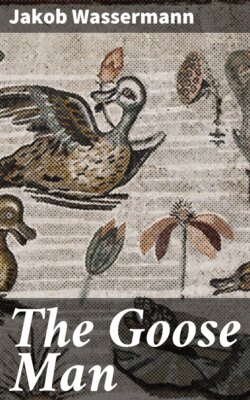Читать книгу The Goose Man - Jakob Wassermann - Страница 36
На сайте Литреса книга снята с продажи.
VII
ОглавлениеTable of Contents
One evening Daniel entered the house and met Herr Carovius. But he was so absorbed in thought that he passed by without noticing him. Carovius looked at him angrily, and walked back to the hall to see where the young man was going. When he heard him ring the bell on the second floor, an uneasy expression came over his face. He rubbed his chin with his left hand.
“The idea of passing by me as though I were a block of wood,” murmured Carovius spitefully. “Just wait, young man, I’ll make you pay for that.”
Instead of leaving the house as he had wished, Carovius went into his apartment, lighted a candle, and tripped hastily through three rooms, in which there were old cabinets and trunks filled with books and music scores. There was also a piano in one. He then took a key from his pocket, and unlocked a fourth room, which had closed shades and was in fact otherwise quite oddly arranged.
He went to a table which reached almost the full length of the room, picked up a piece of white paper, sat down, and wrote with red ink: “Daniel Nothafft. Musician. Two months in jail.”
He then covered the paper with mucilage, pasted it on a wooden box which looked like a miniature sentry-house, and nailed a lid on the box, using tacks that were lying ready for this purpose.
There were at least five dozen such boxes on the long table, the majority of which had names attached to them and had been nailed up.
The closed room Herr Carovius called his court chamber. What he did in it he termed the regulation of his affairs with humanity, and the collection of little wooden cells he called his jail. Every individual who had offended, hurt, humiliated, or defrauded him was assigned such a keep in which he was obliged to languish, figuratively, until his time, determined by a formal sentence, was up.
Nor was this all. In the middle section of the table there were a number of diminutive sand heaps, about thirty in all, and on each one was a small wooden cross and on each cross was a name. That was Herr Carovius’s cemetery, and those who were figuratively buried there were, so far as he was concerned, dead, even though they were still going about their earthly affairs as lively and cheerful as ever. They were people whose mundane careers were finished, as he saw it, and under each of their accounts, reckoned exclusively in sins, he had drawn a heavy line. They were such people as Richard Wagner and his champions, the local stationer to whom he had advanced some money years ago and who entered a plea of bankruptcy a few months later, the authors of bad books that were widely read, or of books which he loathed without having read them, as, for instance, those of Zola.
There were still a third noteworthy section of the table, and that was the so-called Academy. This consisted of a plot of ground, surrounded by an iron fence, and divided up into twelve or fifteen square fields, each of which was painted in fresh green. In the middle of each field there was a wooden peg about two inches high, and to the middle of each peg there was attached a name-plate. From the tops of some of these pegs little banners of green cloth fluttered in the breeze.
The fact is, Herr Carovius had a weakness for association with aristocrats. In his heart of hearts he admired the manners of the aristocracy, their indifference and self-complacency, their irrefragable traditions and their noiseless and harmonious behaviour. To the pegs of the Academy he had affixed the names of some of the best families he had known; among others, those of the Tuchers, the Hallers, the Humbsers, the Kramer-Kleets, and the Auffenbergs. Whenever he had succeeded in making the personal acquaintance of the members of any of these families, he went straightway to the Academy and hoisted the appropriate flag.
But, despite all his effort, he had never in the course of time been able to run up more than three flags, and these only for a brief period and without any marked success. Some one had recognised him on the street or spoken to him at the concert, and that was all. The Academy looked, in contradistinction to the jail and the cemetery, quite deserted. Finally he was able to hoist the Auffenberg banner. Herr Carovius felt that the Academy had a great future.
